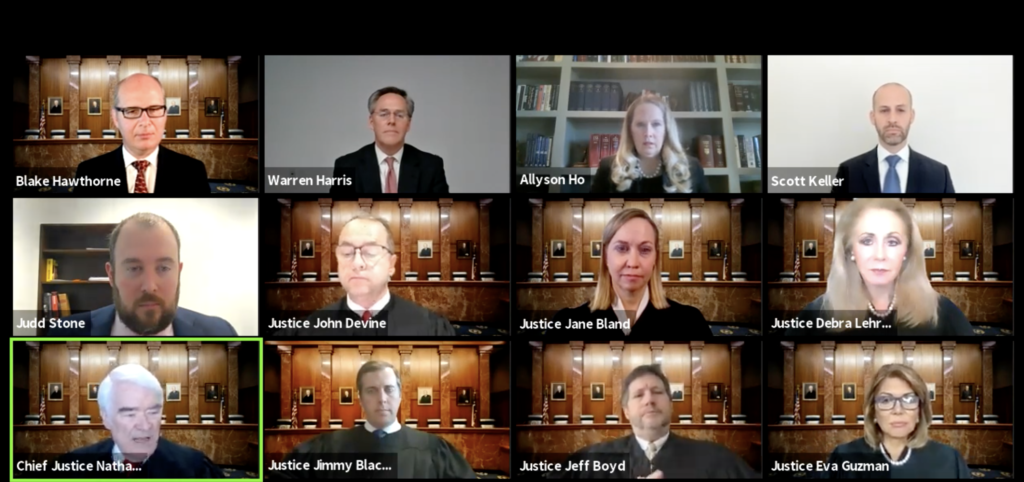Lawyers for three Texas teenagers who were targeted by sexual predators on Facebook, raped and forced into sex trafficking told the Supreme Court of Texas Wednesday that a federal law protecting social media sites from defamation litigation should not shield them their duty to warn and protect minors using its website.
Facebook lawyers countered that Section 230 of the Communications Decency Act does legally protect their client from these kinds of allegations and that the plaintiffs’ lawyers “artfully pled” case trying to focus on Facebook’s duty to warn should be rejected.

The three cases are being monitored by legal experts nationwide because a win for the plaintiffs could open the floodgates for litigation against Facebook and other social media outlets brought by victims of sexual predators across the country.
The Texas Attorney General’s office told the Texas justices that the state sides with the victims and believes Facebook should be put on trial in Houston.
A Texas Supreme Court ruling against Facebook would be unprecedented.
Seven state Supreme Court justices aggressively quizzed both sides during the 44-minute oral argument. Two justices, Brett Busby and Rebecca Huddle, recused themselves from the case.
Three teenagers – two were 14 and one was 15 – sued Facebook in 2018 in Harris County district court claiming that they were victimized by those in the sex trade who used Facebook and Instagram. In their lawsuits, they claim Facebook failed to warn them about the dangers of sexual predators and failed to instill parental safeguards to protect minors.
Facebook asked the Harris County district judge to dismiss the case because it was immunized from such lawsuits under Section 230, but the trial court refused. Facebook appealed to the Fourteenth Court of Appeals in Houston, which also rejected its petition.
Lawyers for Facebook filed a writ of mandamus with the Texas Supreme Court, which agreed to hold oral arguments on the matter.
“When legislators immunize certain defendants from liability, the job of courts is to enforce the immunity,” Allyson Ho, a partner at Gibson, Dunn & Crutcher in Dallas and a lawyer for Facebook, told the justices Wednesday.
Ho said that the plain text of Section 230 bars plaintiffs from treating Facebook as a publisher and holding it legally responsible for a third party’s speech.
Judge Debra Lehrmann asked Ho how Section 230 applies. “The claim doesn’t have anything to do with defamation or speech. It has to do with failure to warn,” the justice stated.
“Failure to warn is no different than a claim that the third party content should not have been published in the first place,” Ho responded. “After all, a warning is an instruction to disregard or not to read or not to attend to the third party content [and] is no different than a decision to not publish the content to begin with.”
Justice Lehrmann seemed to have doubts.
“Except the claim is not about the published statement,” she said. “The claim is about the failure of the company to warn that this could lead to violent sexual behavior.”
“Without the third party content here, there would be nothing to warn about,” Ho responded. “Facebook’s only connection to the content, to the conduct and to the consequences is publishing the third party’s speech and that’s precisely what section 230 bars.”
Facebook “abhors” the conduct of the predators, Ho said, but that does not strip the social media giant of its immunity.
Warren Harris, a partner art Bracewell in Houston and a lawyer representing the three victimized teenagers, said Facebook has stretched its argument for immunity far beyond Congress’ intent with Section 230.
“Plaintiffs seek to hold Facebook liable for its own conduct in suggesting friends and encouraging social connections between and amongst its users – not passively publishing third party content,” Harris told the justices.
“Mining a user’s personal data and applying proprietary algorithms to recommend friends and encouraging social connections is not publisher or speaker activity within Section 230 protections,” he argued.
Appearing as amicus curiae, Texas Solicitor General Judd Stone told the justices that Section 230 does not apply in this case.
“Plaintiffs neither attribute the words that their rapists said [to them] to Facebook nor claim that Facebook wrongfully removed anything from its platform,” Stone argued. “Instead, plaintiffs seek to hold Facebook liable for what it did and didn’t do – namely knowingly profit from and failing to warn about online sex trafficking.”
In its legal briefs, Facebook argues that the Texas Supreme Court should follow the lead of other courts.
“Plaintiffs ignore — and ask this court to disregard — not only those decisions but also more than twenty decisions by state and federal courts throughout Texas, including three decisions by Texas appellate courts and one by the Fifth Circuit,” Facebook argues. “Each of these decisions refused to allow a suit based on third-party content to proceed in the face of section 230’s broad statutory immunity.”
“If, instead, plaintiffs are permitted to continue litigating their cases, then Texas will become the nation’s sole forum for claims seeking to hold interactive computer service providers liable for third-party generated content in direct contravention of section 230’s plain language,” the brief states.
